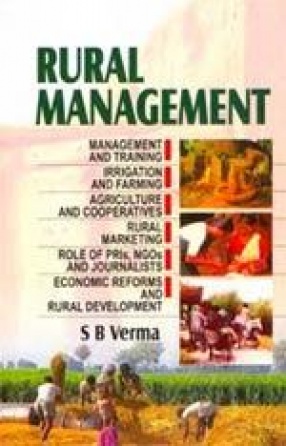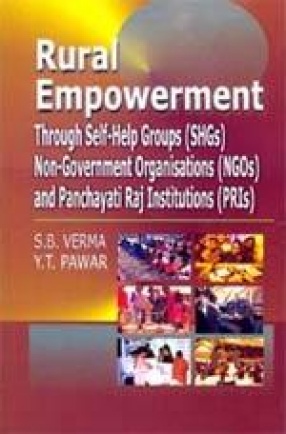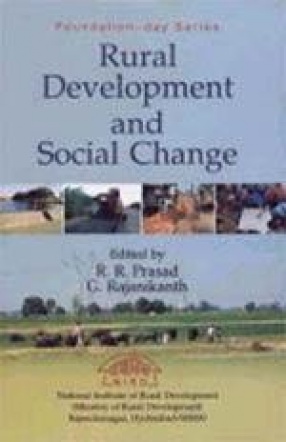
S.B. Verma

Showing all 20 books


















Entrepreneurship development is concerned with the qualitative development of a human being. Entrepreneurship development and economic development are very closely interrelated. While entrepreneurs acting as change agents accelerate the development process, the economic development by creating a conducive atmosphere motivate and encourage more number or potential individuals to join the entrepreneurial class. The problem of unemployment cannot be resolved unless ...

Risk Management starts from the proposition that risks can be measured by using some measure of variability. Risk management is to identify, measure and more importantly monitor the risk profile. Managing risk is nothing but managing the change before the risk manages every one. Its objective is to minimize losses arising from risk exposures. For effective risk management, a comprehensive risk management policy has to be formulated incorporating a detailed ...

Rural Management is the operation of the rural sector as a system. The management system needs to grasp and conceive. It is concerned with the transformation of the rural society. While professionalisation and inculcation of management skills are important, it is equally necessary to sensitise the administrations, workers and managers, creating in them an awareness of the major task of their bringing about rural transformation. People’s participation and ...

The developing countries have the onerous task of maintaining a fine balance between the conditionalities of WTO and protecting the domestic industry from the onslaught of imports. India has been liberalizing quite rapidly since 1991 and the domestic industry has been adjusting to the changes brought about by the process of liberalization and globalization. However, the extent of changes that have been seen till now may be surpassed once the full body of ...

There is a great upsurge in awareness about women's rights among all sections of society. The developmental programmes and policies give emphasis to improving women's social status. In spite of urbanisation and industrialisation our culture and economy are predominantly agrarian, rural based. So empowering women, who are the backbone of our agrarian economy, is a sure path to achieve major economic gains. Our development efforts have yielded creditable benefits ...

Information Technology has emerged as one of the challenging areas that can be a potential force in shaping the management of any organization Information Technology finds its application in successfully carrying out the different managerial functions in the organization at each and every layer of the organization structure. Information Technology is used to describe techniques and procedures involved in data collection, validation and transformation; information ...

Self-help Groups (SHGs) are fast emerging as powerful tool of socio-economic empowerment of the poor in our rural areas. SHG is a small body formed by the people for meeting their specific objective, particularly credit. Next come NGOs who are a group of individuals without external controls having paid or unpaid workers. Panchayats play a major role in the administration of rural development. As panchayat got tremendous public support little need is in rural ...

Environment is meant to serve and support human society, by tproviding raw materials and inputs. Unbalanced approaches of the development, negligence of environment and natural resources have distorted the picture of production as pollution. The development strategy has to reckon the inextricable link between the poverty reduction and the environmental aspects. The tenth plan, therefore, marks a paradigm shift as it visualizes that economic growth along is not ...

This book is a compilation of 46 papers that were presented by policymakers, rural development professionals, academicians and researchers in the NIRD Foundation day Seminar on 'Rural Development and Social Change' organized on 9-10 November, 2005 in National Institute of Rural Development, Hyderabad. These papers were presented and discussed under different themes, and provided a critical analysis of the existing pattern and emerging trends in the area of rural ...

The health of a nation is a sum total of the health of its citizens and communities. To achieve this goal total participation of its citizesn, communities and the government is essential. There is a considerable challenge for optimizing the existing rural health infrastructure throughout the country. Considering the potentiality of the Panchayati Raj Institutions (PRIs) it is proposed that the health infrastructure in the rural areas be made accountable to ...

Despite the steady growth of economy after independence, the problem of unemployment is still on the increase. The benefit of growth has failed to percolate down to the poor people especially in rural areas. The strategy for poverty alleviation includes acceleration of rapid economic growth with a focus on employment intensive sector (generation of income and wealth), access to basic minimum services for improving the quality of life of poorest of poor; and ...

India has a vast pool of rural entrepreneurial talent. Credit flow towards agricultural and allied sectors holds the hope of reversing migration and bringing prosperity. Economic growth requires an improvement in regional balance, it is essential that the government goes slow on its economic reforms programme and plays an active intervention policy in the economic life of the country. There is a need for investment in second Green Revolution from the public and ...

Rural means a fixed number of people living in a community, and development means a positive change in living standard of such people. Rural development cannot be achieved without a complete process of change in rural areas which leads to improvements in rural income, employment opportunities, income distribution, rural welfare and other aspects of rural life. Rural development reform is not a time bound process. It is ceaseless and continuous effort which ...

Cooperatives like village panchayats are institutional agencies for achieving social cohesion. In a country whose economic structure has its roots in the village, cooperation is something more than a series of activities organised on cooperative lines; basically its purpose is to evolve a system of cooperative community organisation which touches upon all aspects of life. Cooperation, therefore, means an obligation towards all families in the village community ...

Rural tourism compasses rural society, culture and beliefs in their original form. It covers all those aspects of travel whereby people learn about each other's ways of life and thought. It signifies the tourists' interest in the customs of the indigenous and exotic people. Rural tourism development is community-based, participatory and designed to improve the economic and social well-being of local villagers in addition to the concerned institutional and ...


Environment is one of the most important pillars of sustainable development process in rural India is urgent from various considerations--social, economic and environmental. Environmental aspect assumes great significance in view of growing deforestation activities, soil erosion, water pollution, land degradation, biodiversity loss and the like which continue to worsen and hinder economic development in rural India. The common property resources, which are by and ...

Banking today has become more complex with different products and services which seems from reliance on automation and technological change which has shaped it from a manual-intensive industry into one highly automated and technology dependent. The process of doing banking functions deploying Information Technology is a definition of 'Electronic Banking'. The scope and reach of electronic banking, e.g., E-Banking has undergone a complete revolution. This now ...

There is a basic shift in the paradigm of risk management practices and has placed greater emphasis on the successful identification, quantification, mitigation, control and financing of risk. Evolving concepts of risk are leading to complex management perspectives requiring an integrated view of the finances and operations of a corporation. Today's risk manager must generate a comprehensive context of risks faced by the enterprises. The process of risk ...
